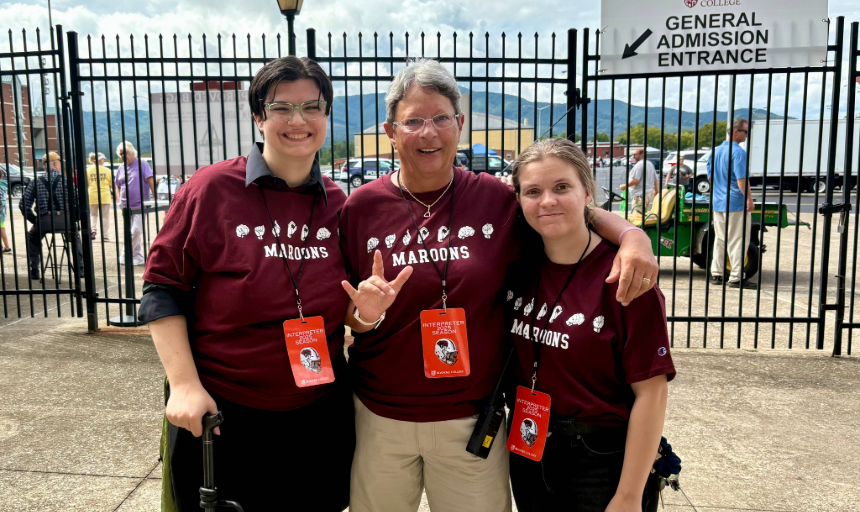Roanoke introduces ASL courses, strengthens accessibility on campus
November 05, 2025
Category: Our Community

When Roanoke College added American Sign Language to its course catalog last year, Lavender Oman ’26 (they/them) knew immediately they wanted to sign up, even though they already had enough language units.
For Oman, it was more than just another class. It was a chance to explore a new language and a rich culture that includes more than half a million people nationwide. It was also personal: Oman, who experiences trouble speaking, saw ASL as a way to expand how they connect and communicate with others.
“It was an amazing development for Roanoke to offer these courses,” Oman said, “and I am excited to see the program grow.”
Oman isn’t alone. Since launching, ASL classes at Roanoke have been nearly full at both the beginner and intermediate levels. The courses attract students who want to develop valuable career skills, expand their communication toolkit, and gain a deeper understanding of different perspectives and experiences of the world.
“Students are excited to learn how to communicate inclusively,” said Frances McCutcheon, coordinator of the Disability Studies Program at Roanoke. “Studying ASL isn’t just about learning another language. It is about understanding Deaf culture and understanding an inclusive form of communication that is used by many groups, including non-verbal autistic individuals.”
Sign language had become a frequently requested course among incoming freshmen who were introduced to ASL in high school and wanted to continue learning it at Roanoke College. Nationwide, demand for ASL programs is growing, making it the third most studied language in secondary education, according to the Modern Language Association.
The rise in interest and awareness is occurring at a time when ASL skills are increasingly valued in fields like health care, education, social services and more.
Roanoke’s courses were created by longtime interpreter and ASL instructor Dedi Spradlin, in collaboration with the Disability Studies Program, and count toward the college’s language learning requirement. Now in its second year, the program is offering four classes: ASL-101, ASL-102, ASL-201 and ASL-202.
The real-world relevance of the skills being learned was on full display at Salem Stadium in September when Roanoke’s football team faced off against the team from Gallaudet University, a federally chartered school that is the world’s only liberal arts university for the Deaf and hard-of-hearing communities.
To ensure the stadium experience was accessible and welcoming for fans of both teams, Spradlin arranged for interpreters — including Roanoke students — to volunteer throughout game day. Interpreters assisted people at the stadium gates, translated the performance of the national anthem, and facilitated a halftime meetup with Gallaudet alumni and state leaders.
In addition, Campus Safety came prepared with language cards and new expertise gained from a two-day workshop provided by the Virginia Department for the Deaf and Hard of Hearing. The training was requested by Campus Safety and the Salem Police Department, with officers from both agencies taking part.

Photo Credit: Virginia Department for the Deaf and Hard of Hearing
“At Roanoke College, we work every day to strengthen relationships with the communities we serve,” said Campus Safety Director Joe Mills. “Training like this helps ensure we’re able to communicate respectfully and effectively with anyone who needs help. I’m grateful to everyone who worked so hard to make this event a success.”
For visitors from Gallaudet, the experience was a positive one. Daphne Cox, a Gallaudet alumna and board member with the Staunton-based Virginia School for the Deaf and Blind, said Roanoke’s planning and outreach made it easier for all fans to enjoy the game.
“Your efforts created a Deaf-friendly environment and a communication barrier-free experience for all,” Cox wrote. “Your commitment to inclusion, accessibility, and cultural respect truly made a difference. Thank you from the bottom of my heart for championing awareness and making everyone feel seen, heard, and valued.”